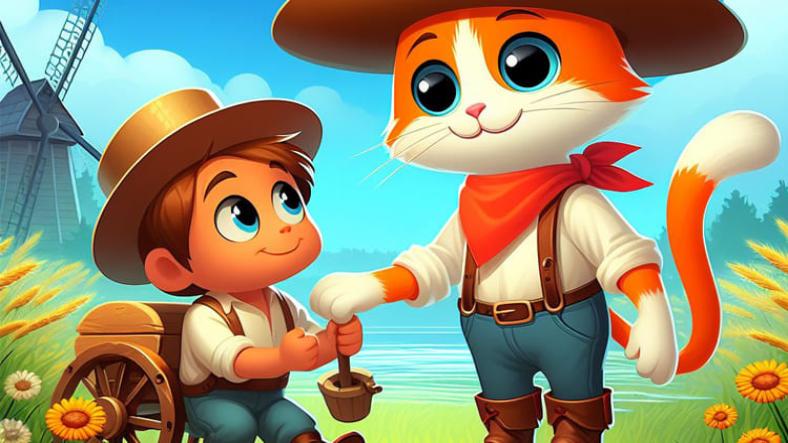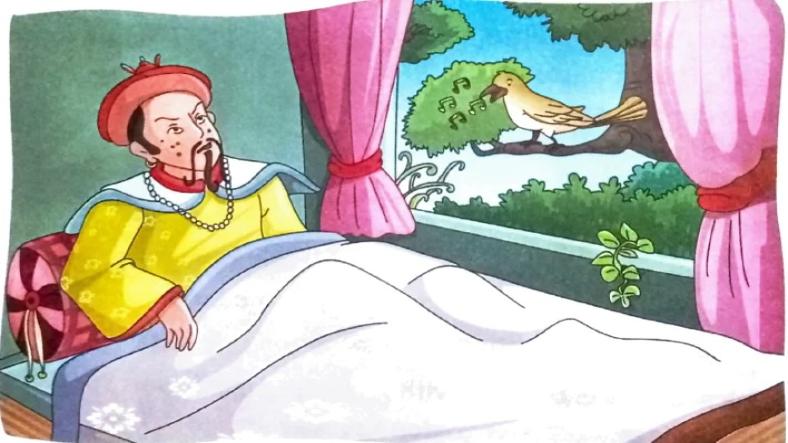Once upon a time, there lived a poor miller who had three sons. When the miller passed away, he left his mill to the eldest son, his donkey to the second son and to the youngest son, all he left was a cat. The youngest son was disappointed. "What can I do with just a cat?" he wondered. "I’ll surely starve."
But this was no ordinary cat. The cat, who wore a pair of clever boots, spoke to the young man, "Do not worry, master. Give me a bag and a pair of boots and I will make your fortune."
Though surprised, the young man gave the cat what he asked for. The cat, now called "Puss in Boots," took the bag, put on his boots and set out for the forest. There, he caught a rabbit by cleverly setting a trap with the bag. He brought the rabbit to the king's palace and presented it as a gift.
"Your Majesty," said Puss in Boots, "this is a gift from my noble master, the Marquis of Carabas." (The cat had given his poor master a grand title.)
The king was pleased with the gift and sent his thanks to the "Marquis of Carabas." Over the next few weeks, Puss in Boots continued to bring fine gifts to the king, such as partridges and pheasants, all in the name of his "master."
One day, the cat learned that the king and his daughter, the princess, would be riding along the river in their royal carriage. Puss in Boots rushed back to his master and said, "Master, if you do as I say, your fortune will be made! Go bathe in the river and leave the rest to me."
Though confused, the young man trusted the clever cat and did as he was told. As the king’s carriage approached, Puss in Boots ran up to the carriage in a panic, shouting, "Help! Help! My master, the Marquis of Carabas, is drowning!"
The king immediately ordered his servants to rescue the young man from the river. The cat, quick on his feet, explained to the king, "While my master was bathing, some thieves stole his clothes." Of course, this was all part of Puss in Boots’ clever plan. The king, feeling sorry for the "Marquis," ordered fine clothes to be given to him.
When the young man appeared before the king in his new clothes, he looked so noble and handsome that the king’s daughter immediately took notice of him.
As they rode along, Puss in Boots ran ahead to a large field owned by a wealthy ogre. He approached the farmers working in the field and said, "If anyone asks, tell them that this land belongs to the Marquis of Carabas, or you will all face the wrath of the ogre."
The farmers, afraid of the ogre, agreed to do as the cat said. When the king’s carriage passed by, he admired the fields and asked, "Who owns this beautiful land?"
"The Marquis of Carabas, Your Majesty!" the farmers replied.
The king was impressed and continued his ride. Meanwhile, Puss in Boots reached the ogre’s grand castle and devised another clever trick. The ogre was known for his magical powers, so Puss in Boots boldly went inside to meet him.
"I’ve heard of your incredible powers, mighty ogre," said Puss in Boots. "I heard you can transform into any creature you like. But I doubt you can turn yourself into something as small as a mouse."
The ogre, proud of his abilities, laughed and said, "Watch this!" He instantly transformed himself into a tiny mouse. Quick as lightning, Puss in Boots pounced on the mouse and ate it up!
With the ogre gone, the castle now belonged to the young man. When the king arrived at the castle, he was even more impressed and said to the young man, "You must be very wealthy, Marquis of Carabas. I would be honored to have you marry my daughter."
The young man, amazed by his good fortune, agreed and soon he and the princess were married. Thanks to the cleverness of Puss in Boots, his master became wealthy and lived happily ever after.
Moral of the story: "Cleverness and resourcefulness can bring great fortune." It's not always strength or riches that lead to success, but quick thinking and ingenuity.
Thanks for reading the article, for more quick reads read our peoples blog articles.












